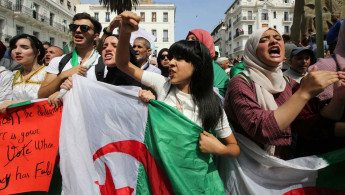Algeria military orders ban on protesters entering capital amid protests against early election
The restriction on movement of demonstrators from elsewhere in the country comes after months of mass rallies held across the nation.
The protest movement - which started as a rejection of former President Abdelaziz Bouteflika's bid for a fifth term but has continued since his resignation - entered its eighth month on Monday.
Demonstrators remain steadfast in their calls for the military to relinquish its tight grip on power and allow a full democratic transition in the North African nation.
"I have instructed the national gendarmerie to deal with these actions with firmness," General Ahmed Gaid Salah, the country's most influential figure the April resignation of Bouteflika, said on Wednesday.
Salah's intervention prompted the former president to step down after almost 20 years in power, but he has since been one of the main targets of protesters' ire.
Protesters in the capital Algiers on Tuesday to demand the cancellation of a controversial presidential election due to be held on 12 December.
Interim President Abdelkader Bensalah announced the date of the vote on Monday.
Activists, though, have urged political reform and the removal of Bouteflika regime loyalists such as Salah before an election takes place.
"The Algerian authorities initially tolerated the protests by millions of people that began in February to demand political reform," Lama Fakih, acting Middle East and North Africa director at Human Rights Watch, said earlier this month.
"But Algeria's authorities are now turning the vise, jailing flag-wavers and turning back would-be marchers," she added, referring to dozens of demonstrators arrested for waving Amazigh (Berber) flags.





 Follow the Middle East's top stories in English at The New Arab on Google News
Follow the Middle East's top stories in English at The New Arab on Google News
![Both Hamas and the Palestinian Authority welcomed the ICC arrest warrants [Getty]](/sites/default/files/styles/image_330x185/public/2024-11/GettyImages-2178351173.jpg?h=199d8c1f&itok=TV858iVg)

